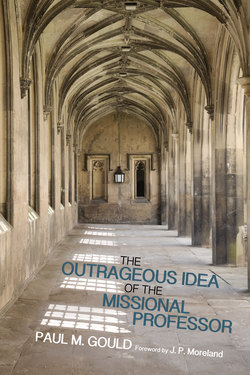Читать книгу The Outrageous Idea of the Missional Professor - Paul M. Gould - Страница 5
На сайте Литреса книга снята с продажи.
Foreword
ОглавлениеI was raised in a liberal Methodist church in Kansas City, and never understood much about God and Jesus except that I came to believe that they had something to do with Midwest moral values. So I carted off to the University of Missouri in 1966 to major in chemistry with the hope of getting a PhD in the subject after my undergraduate work. But all that changed for me in 1968 when I was presented with the claims of Christ in a rational, attractive way. It was then that I became his follower in November of that year through the ministry of Campus Crusade for Christ. Upon graduation in 1970, I turned down a fellowship to do a doctorate in nuclear chemistry at the University of Colorado (though it would have been a noble calling; it just wasn’t mine) to join the staff of Crusade. During the eighteen months of being a Christian in my undergraduate days, I had shared my faith with a number of unbelievers. And I got asked a lot of questions I couldn’t answer. From 1970–75, I was on Crusade staff in Colorado and Vermont, and the questions and objections continued. I did the best I could to find answers for people, but my academic training was limited. So I left staff to pursue a ThM in theology and an MA and PhD in philosophy with the hope that I could use my training and gifts to win people to Christ, help believers grow, and to show that Christianity should be located deeply within the rational plausibility structure of our culture.
But the task proved harder than I had imagined. During my days on Crusade staff, two things became evident to me. First, the university was the most powerful, influential structure in Western culture. Second, the university professor had a disproportionately large impact on people and society when compared to pastors and people in other professions. Given these two beliefs, it did not take a rocket scientist to conclude that we needed more academically robust, biblically faithful Christian colleges and universities, and we also needed more articulate, outspoken Christian professors on secular university campuses. Thus, my graduate training and subsequent ministry for thirty years after my PhD have centered on contributing to these aims, along with raising the bar among non-“academic” Christians to value more highly the role of the mind in the Christian life.
Well, in light of this, I have good news and bad news. The good news is that many other Christian leaders and thinkers shared my passion and, as a result, things have definitely improved low these many years. The bad news is that the improvement has not been what all of us had hoped it would be. There are several reasons for this, but I am convinced that a central factor is this: We concentrated our efforts on fostering the integration of Christian truth and knowledge claims with truth and knowledge claims in various academic disciplines (the so-called “integration of faith and learning” movement), thinking that instruction in the importance of and approaches to such integration would solve the problem. But there was something missing in our thinking, something that was prior to discussions of integration without which those discussions often remained at the level of intellectual curiosity or a faddish fascination with a new intellectual hobby.
In the book, professor Gould puts his finger on what has been missing—the priority and pervasive importance of emphasizing the centrality of being a missional professor. Indeed, the idea is so radical (though it should not be) that he calls the notion “outrageous.” I won’t spoil the reader’s fun by telling you what a missional professor is. Besides, the idea is so crucial, that there are many, many implications that flow from it, and a forward could not begin to do them justice. But, again, the key implications are drawn, explained, motivated and illustrated in this book.
I have known Paul Gould for almost two decades, and I have traced his journey as a Christian activist, philosopher, disciple of Jesus, and lover of people. And I say before the Lord that I cannot think of someone more qualified to write this book than Paul. He has lived this message for years. It is in his blood.
This is now the go-to book for Christian college presidents, provosts, deans, and faculty. The emphasis on the integration of faith and learning must take a back seat, at least briefly, to allow priority to be given to the issue of being a missional professor and, indeed, a missional institution. And Christian professors on secular campuses should gather into groups and make this the first book they read together.
So get ready to read an outrageous book, and let it fill your mind with vision and your heart with hope and courage.
J. P. Moreland
Distinguished Professor of Philosophy
Biola University
August 2014
